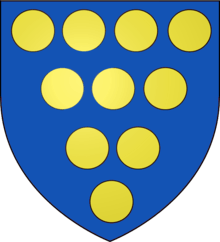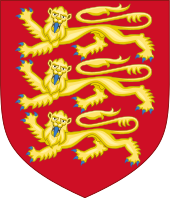William Zouche
William de la Zouche (1299–1352) was Lord Treasurer of England and served as Archbishop of York from 1342 until his death.
William Zouche | |
|---|---|
| Archbishop of York | |
| Elected | 2 May 1340 |
| Installed | 1342 |
| Term ended | 19 July 1352 |
| Predecessor | William Melton |
| Successor | John Thoresby |
| Other posts | Dean of York |
| Orders | |
| Ordination | c. 1317 |
| Consecration | 7 July 1342 by Pope Clement VI |
| Personal details | |
| Born | 1299 Lubbesthorpe, Leicestershire |
| Died | 19 July 1352 Cawood Palace, Yorkshire |
| Buried | York Minster |
| Denomination | Roman Catholic |
Origins
He was the youngest son of Sir Roger de la Zouche (d.1302) of Lubbesthorpe[2] in Leicestershire (younger brother of William la Zouche, 1st Baron Zouche (1276–1351) of Harringworth, Northamptonshire) by his wife Juliana de Brascy.
Career
He was educated at Oxford University where he graduated as a Master of Arts and a Bachelor of Canon Law, before taking holy orders. He served as a royal chaplain before entering the Treasury and was appointed Keeper of the Wardrobe from 1329 to 1334, Controller of the Wardrobe from 1334 to 1335 and Lord Privy Seal from 1335 to 1337.[3]:94 In 1337 he was promoted to Lord Treasurer, a post which he held until March 1338, and again from December 1338 to May 1340.[3]:104
After preferment to various benefices, in 1329 he was appointed Archdeacon of Barnstaple in Devon,[4] was collated Archdeacon of Exeter on 12 July 1330[5] and was made Dean of York in 1336.
Following the death of William Melton, Archbishop of York, King Edward III wanted his secretary, William de Kildesby (of Kilsby) elected to the post.[6] However, the Canons of York Minster elected Zouche, then Dean of York, on 2 May 1340.[3]:282 The king endeavoured to set aside the election, but without effect, and after a delay of two years, Zouche was consecrated at Avignon on 7 July 1342 by Pope Clement VI.[3]:282
Zouche had been in the employ of Edward III before his elevation to the see, but had fallen out of favour. He was not forgiven until 1346, when he was appointed a Warden of the Marches. In this capacity he led one of the bodies of English troops which defeated the Scots at the Battle of Neville's Cross, near Durham, on 18 October 1346. The king was extremely thankful and Archbishop Zouche was asked to continue his careful watch over the Scottish Marches.
Whilst Zouche was serviving as archbishop, the Black Death spread throughout England and his province, thus in 1349 he sought papal approval to consecrate extra burial grounds and to ordain replacement clergy.[7]:401–402
Death and burial
Zouche died on 19 July 1352[8] at Cawood Palace and was buried before the altar of St Edward in the nave of York Minster. He founded and began the building of a chantry chapel adjoining the south wall of the choir. This appears to have been demolished when Thoresby's wider choir was built and no trace of it remains.[9]
See also
References
- See e.g. J. Nichols, 'History and Antiquities of Leicestershire', vol. iii, pt. 1, p. 514. London, 1800.
- Bennett, Nicholas (2004). "Zouche, William (d. 1352)". Oxford Dictionary of National Biography. Oxford University Press. doi:10.1093/ref:odnb/30303. Retrieved 5 November 2013. (subscription or UK public library membership required)
- Fryde, E. B.; Greenway, D. E.; Porter, S.; Roy, I. (1996). Handbook of British Chronology (3rd ed.). Cambridge: University Press. ISBN 978-0-521-56350-5.CS1 maint: ref=harv (link)
- Horn, Joyce M., ed. (1964). "Archdeacons: Barnstaple". Fasti Ecclesiae Anglicanae 1300–1541. 9, Exeter Diocese (Online ed.). London: Institute of Historical Research. pp. 19–21. Retrieved 22 February 2015 – via British History Online.
- Horn, Joyce M., ed. (1964). "Archdeacons: Exeter". Fasti Ecclesiae Anglicanae 1300–1541. 9, Exeter Diocese (Online ed.). London: Institute of Historical Research. pp. 12–15. Retrieved 22 February 2015 – via British History Online.
- Waugh, Scott L. (2004). "Kilsby, William (d. 1346)". Oxford Dictionary of National Biography. Oxford University Press. doi:10.1093/ref:odnb/50146. Retrieved 22 February 2015. (subscription or UK public library membership required)
- Raine, James (ed) (1873). Historical Letters and Papers from the Northern Registers.CS1 maint: extra text: authors list (link)
- Fryde, 282
- King, Richard John (1869). Handbook to the Cathedrals of England. Vol. 1, Part 2. London: John Murray.
| Political offices | ||
|---|---|---|
| Preceded by Robert Tawton |
Lord Privy Seal 1335–1337 |
Succeeded by Richard Bintworth |
| Preceded by Henry Burghersh |
Lord High Treasurer 1337–1338 |
Succeeded by Robert Wodehouse |
| Preceded by Robert Wodehouse |
Lord High Treasurer 1338–1340 |
Succeeded by Robert Sadington |
| Catholic Church titles | ||
| Preceded by William Melton |
Archbishop of York 1342–1352 |
Succeeded by John of Thoresby |

